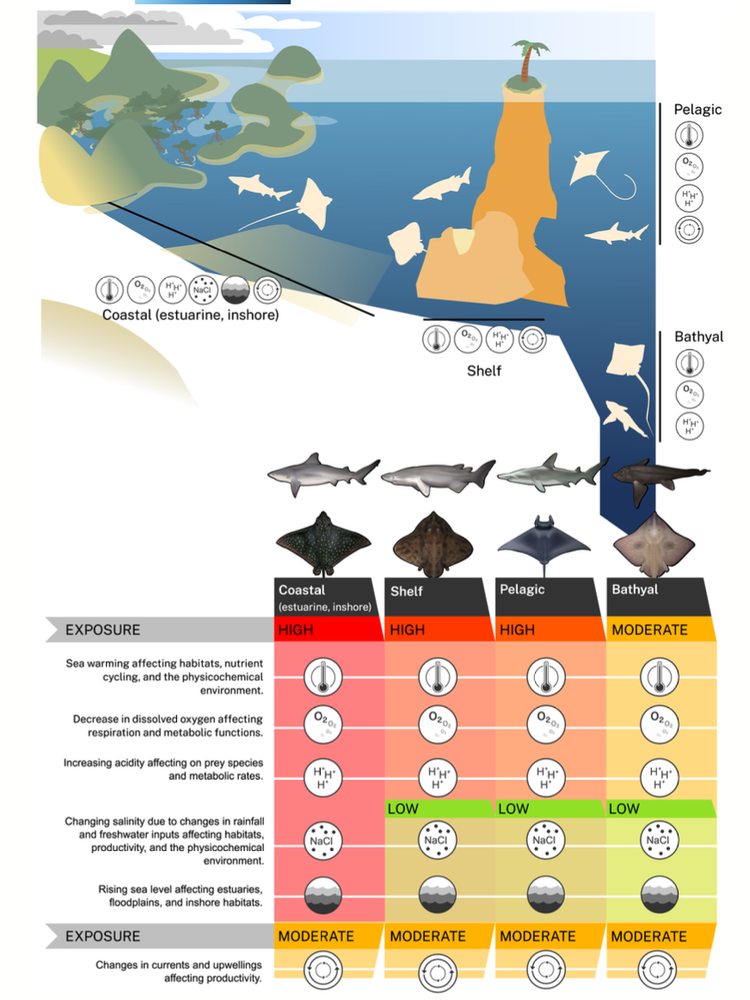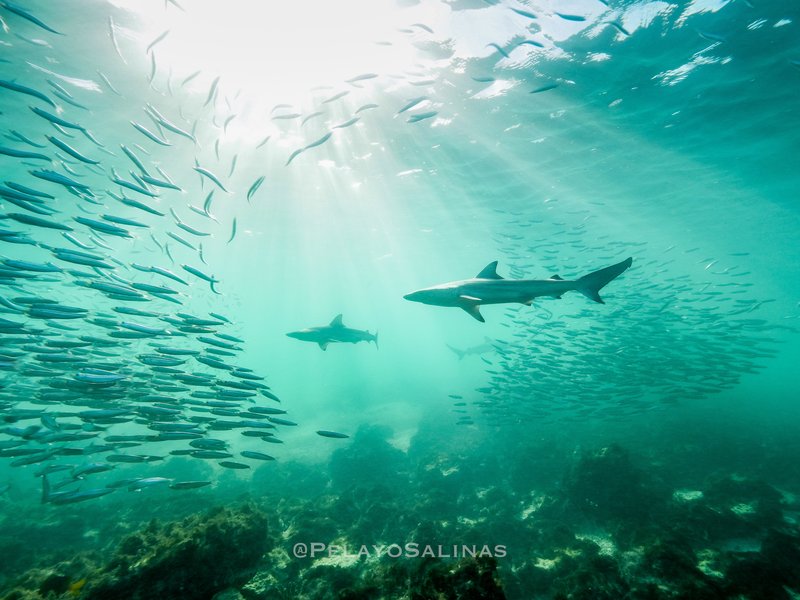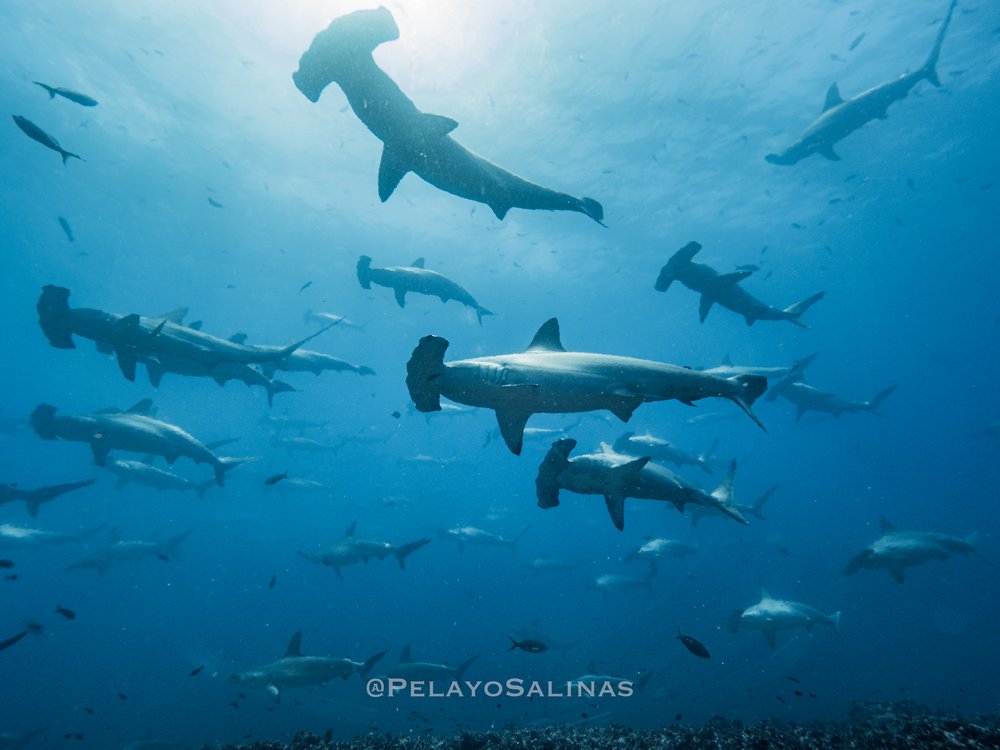Study Highlights the High Vulnerability of Eastern Tropical Pacific Sharks, Rays, and Chimeras to Climate Change
Puerto Ayora, 22 August 2024 – A recent study published in the prestigious scientific journal Global Change Biology reveals that nearly a quarter of chondrichthyan species (cartilaginous fish including sharks, rays, and chimeras) in the Eastern Tropical Pacific (ETP) are highly vulnerable to climate change. The study, involving 19 regional experts from 15 different institutions, used an integrated risk assessment framework to analyze how these species are being affected by climatic changes.
Climate change is leading to warmer, more acidic, and oxygen-depleted ocean—changes that severely threaten all marine ecosystems. According to the research, 23% of ETP chondrichthyan species assessed are highly vulnerable, with the remaining 76% showing moderate vulnerability. The most affected are rays (77%), especially those that use coastal habitats as nursery areas. Five of the most affected rays are also listed as Critically Endangered or Endangered on the IUCN Red List, including the large-tooth sawfish, reticulate round ray, giant manta, Chilean devil ray and Bentfin mobula. The iconic great hammerhead shark, listed as Critically Endangered by the IUCN, was also found to be most vulnerable.
"Our study highlights the urgent need to develop management actions that consider the impacts of climate change on marine ecosystems in the Eastern Tropical Pacific to mitigate the negative consequences of this global phenomenon. Coastal species, especially rays, are the most affected and require specific conservation measures to ensure their survival and the resilience of the ecosystems they inhabit," says Dr. Florencia Cerutti-Pereyra, lead author of the study and scientific collaborator on the Charles Darwin Foundation's Shark Ecology and Conservation project.

Coastal species are particularly vulnerable due to the combination of ocean warming, acidification, and potential deoxygenation, along with changes in freshwater input, salinity, and sea level rise. These climatic factors are adding to other existing threats such as overfishing and habitat degradation.
The study emphasizes the urgent need to implement strategies to reduce the impacts of climate change on this threatened group of species, including habitat protection, sustainable fishing practices, and specific measures for species at greatest risk. It also highlights the importance of better understanding the effects of climate change on key habitats and processes in the ETP, as well as filling knowledge gaps about the region's chondrichthyan species.
"Climate change is increasingly evident, with a significant influence on all species and ecosystems in our oceans. If we want sharks, rays, and chimeras to remain as vital components in maintaining ocean health, it is crucial to reduce greenhouse gas emissions, promote sustainable fishing practices, and implement conservation programs for threatened species. Only through an integrated and coordinated approach can we preserve biodiversity and maintain the functionality and resilience of marine ecosystems," explains Dr. Pelayo Salinas de León, co-author of the study and co-Principal Investigator of the Charles Darwin Foundation's Shark Ecology and Conservation project.

The study's findings highlight the need for integrated management strategies that address both climatic and human impacts. The combination of climate change with overfishing and habitat degradation exacerbates the vulnerability of these species, making it imperative to develop and implement effective conservation strategies.
"This collaborative effort with regional experts has deepened our understanding of how global climate change affects sharks, rays, and chimeras in the Eastern Tropical Pacific. Now, it’s time to apply this knowledge in management policies to ensure the long-term conservation of these species," adds MSc. Ana Moya, co-author of the study and researcher on the Charles Darwin Foundation's Shark Ecology and Conservation project.

A total of 132 species of chondrichthyans (65 sharks, 60 batoids, and 7 chimaeras) were evaluated. The risk assessment undertaken used three components to evaluate climate change vulnerability: exposure, sensitivity, and adaptive capacity, and seven climate change factors. Each species was assessed based on these components and rated as having low, moderate, or high vulnerability. The study is freely available in the scientific journal Global Change Biology and can be accessed through this link.
The Charles Darwin Foundation thanks the organizations committed to the protection and survival of these species, which are vital to marine ecosystems and the local economy. The support of United States Agency for International Development (USAID), the National Polytechnic Institute (COFAA and EDI), Save Our Seas Foundation, the Mark and Rachel Rohr Foundation, and others has been essential in carrying out this study.
For media enquiries, please contact:
Charles Darwin Foundation
Daniela Ibarra or Leslie León
comunicacion@fcdarwin.org.ec
About the Charles Darwin Foundation
The Charles Darwin Foundation for the Galapagos Islands (CDF) is an international nonprofit organization present in Galapagos since 1959, operating under a special agreement with the Government of Ecuador. Its mission, and that of its Research Station, is to address the greatest threats and challenges facing Galapagos through scientific research and conservation actions, with the goal of protecting one of the world’s most important natural treasures. Currently, CDF carries out more than 25 research and conservation projects and is the custodian of more than 135,000 specimens within its Natural History Collections. Our diverse team of more than 140 people is predominantly composed of Ecuadorian citizens, with over 60% being residents hailing from the Galapagos Islands. For more information, visit: www.darwinfoundation.org




